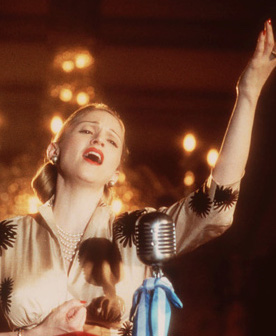It's Madonna's birthday!! Chris Feil looks back at one of her biggest soundtracks...
 By the mid-90s, musicals were all but dead, even though Disney created their own resurgence in animated form. Madonna’s career however was always heading toward reviving it: she constantly reinvented the game for the music video and her Breathless Mahoney songstress was Dick Tracy’s genre flirtation device. With her divisive performance in Evita, she brought the cinematic musical back into the popular culture and delivered a hit soundtrack in the process.
By the mid-90s, musicals were all but dead, even though Disney created their own resurgence in animated form. Madonna’s career however was always heading toward reviving it: she constantly reinvented the game for the music video and her Breathless Mahoney songstress was Dick Tracy’s genre flirtation device. With her divisive performance in Evita, she brought the cinematic musical back into the popular culture and delivered a hit soundtrack in the process.
And I should qualify that for emphasis: a hit soundtrack to a quasi-opera about propaganda and Argentine political figures when the popular music landscape highlighted Alanis, Tupac, and The Smashing Pumpkins. Madonna did that in arguably the least accommodating musical or cinematic climate, and perhaps only Madonna could have done it. Like it or not, much of the film’s success (even musically) is thanks to her star power, no matter how indelible Andrew Lloyd Webber and Tim Rice’s score remains.
But even calling her work “divisive” probably stirs something in either side of the debate. Madonna fans hold firm on her crystalline vocals and charisma, not to mention how she pushed her vocal abilities to find a new upper register. Broadway fans bemoan her lack of face-melting heights and less imposing presence like Patti LuPone brought to the stage. A fair viewpoint is somewhere in the middle: her vocal track strains to some more tricky melodic moments, but it’s not nearly as egregious a dumbing down of a score for as we have seen from the less vocally adept likes of Gerard Butler or Russell Crowe.
Regardless of expectations that Madonna may or may not meet, her performance bolsters the score on her emotion and sheer determination to succeed. Before “You Must Love Me”, she sings live with Jonathan Pryce to heartbreaking effect; her “A New Argentina” isn’t as upending as LuPone’s, but is nevertheless convicted and convincing. You can’t even argue with the star hijacking another character’s number when she brings such radio-ready beauty to “Another Suitcase in Another Hall.”
There is also something valuable and appropriate to the score with her pop sensibilities. Webber’s work always has one foot firmly in the pop music pond no matter where the other foot wanders, and here is precisely where Madonna excels. Other Evas may own the more difficult songs, but nobody nails the wide-eyed eager excitement of “Buenos Aires” like she does.
But some of the thinness in the film’s musical numbers can also be attributed to a certain buffing down of the score’s thorniness for the screen. Where the stage allowed for various interpretations of the Perons and their methods, the film is interested exclusively in sainthood without modifying the text. Madonna had some hand in sympathizing the Perons in the film versus the critical (and somewhat inaccurate) stage depiction, as did director Alan Parker. Antonio Banderas’s Che remains a thrilling critical eye, perhaps more meaningfully here as a man of the people rather than the stage’s odd use of non-Argentine Che Guevara.
But that alteration comes strictly from tone and approach, making for some odd lyrical moments that don’t sync to how they are played. The music becomes as plush and gauzy as anything else in the staggeringly produced film, but here it feels much more unmotivated. Among its most neutered moments comes with “I’d Be Surprisingly Good For You”, among it’s most beautiful and catchy numbers, but stripped away of any subtextual political maneuvering.
But the crowning achievement of the musical itself and Madonna’s vision is the moment we all wait for: “Don’t Cry For Me Argentina”. Here is where Madonna’s saintly Evita is its most moving and rapturous, convincing in ways that a more conniving Eva doesn’t match. When it feels this personal, it’s no surprise that it became another signature Madonna track and got radio play. Even if you think she's just a wonderful, you know, performer for what she does, you certainly have to credit Madonna for bringing a Broadway tune back to the charts when that was an impossibility. And a successful and bizarre dance remix, as well.
OSCAR TRIVIA: The Original Song win for “You Must Love Me” was handed out by Diane Keaton, Goldie Hawn, and Bette Midler. Almost as fabulous as this 90s diva lineup of nominees (which also included songs from Celine Dion and Barbra Streisand) is the rapport between The First Wives Club - which we previously covered on Soundtracking!
Previous Soundtracking Favorites:
Stop Making Sense
A Mighty Wind
Big Little Lies
Best Worst Thing...
Sister Act
but all installments can be found here!